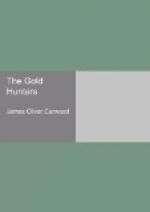Mukoki came across to join them. Out among the rocks he had found a fleck of gold no larger than the head of a pin, and this new sign gave them all fresh enthusiasm. Taking off their boots both Rod and Wabi joined the old pathfinder in midstream. But each succeeding pan added to the depressing conviction that was slowly replacing their hopes. The shadows in the chasm began growing longer and deeper. Far overhead the dense canopies of red pine shut out the last sun-glow of day, and the gathering gloom between the mountains gave warning that in this mysterious world of the ancient cabin the dusk of night was not far away. But not until they could no longer see the gleaming mica in their pans did the three cease work. Wet to the waist, tired, and with sadly-shattered dreams they returned to their camp. For a short time Rod’s hopes were at their lowest ebb. Was it possible that there was no more gold, that the three adventurers of long ago had discovered a “pocket” here, and worked it out? The thought had been growing in his head. Now it worried him.
But his depression did not last long. The big fire which Mukoki built and the stimulating aroma of strong coffee revived his natural spirits, and both Wabi and he were soon laughing and planning again as they made their cedar-bough shelter. Supper on the big flat stone—a feast of bear steak, hot-stone biscuits, coffee, and that most delectable of all wilderness luxuries, a potato apiece,—and the two irrepressible young gold hunters were once more scheming and building their air-castles for the following day. Mukoki listened, and attended to the clothes drying before the fire, now and then walking out into the gloom of the chasm to look up to where the white rim of the fall burst over the edge of the great rock above them. All that afternoon Wabi and Rod had forgotten the mad hunter and the strange, smoothly worn tree. Mukoki had not.
In the glow of the camp-fire the two boys read over again the old account of John Ball and the two Frenchmen. The tiny slip of paper, yellow with age, was the connecting link between them and the dim and romantic past, a relic of the grim tragedy which these black and gloomy chasm walls would probably keep for ever a secret.
“Twenty-seven pounds,” repeated Rod, as if half to himself. “That was one month’s work!”
“Pretty nearly a pound a day!” gasped Wabi. “I tell you, Rod, we haven’t hit the right spot—yet!”
“I wonder why John Ball’s share was twice that of his companions’? Do you suppose it was because he discovered the gold in the first place?” speculated Rod.
“In all probability it was. That accounts for his murder. The Frenchmen were getting the small end of the deal.”
“Eighteen hundred fifty-nine,” mused Rod. “That was forty-nine years ago, before the great Civil War. Say—”
He stopped and looked hard at Wabigoon.
“Did it ever strike you that John Ball might not have been murdered?”




